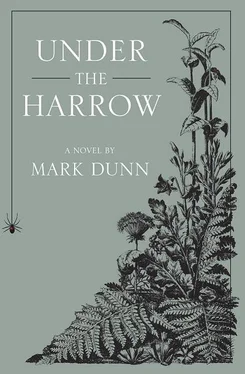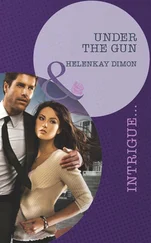I shook my head and crossed my arms upon my chest. “I will not, Muntle. I will not fold my hand as a matter of the strongest principle. I’m not so easily compromised that I should see a young woman placed into a madhouse so that no one’s ‘feathers be ruffled.’”
“Madhouse?”
“What?”
“You said ‘placed into a madhouse.’”
“Did I?” I closed my eyes and repined. I had put my foot in it.
Muntle stared hard at me. “My hearing is not as good as it once was, Trimmers, but I am fairly certain that I just this moment heard you to say that the girl might be placed into a madhouse. And as there is only one ‘madhouse’ in Dingley Dell, I am certain that your specific meaning was Bedlam. Now, out with the rest of it, if you know what’s good for you.”
“Alas, Muntle, I’ve told you too much already.”
I took a silent turn across the room, Muntle watching me, waiting to hear what next I would say. Finally I resumed: “And regardless of what I have unfortunately blurted, there’s no fair reason that Hannah Pupker should be forced to return to a family that so thoroughly maltreats her.”
“I hadn’t heard that the young woman has been made miserable within that household. Would you care to tell me what you know?”
“Things have been spoken to me in confidence, Muntle. I haven’t leave at present to retail them, nor do I know the half of what there is to know of Hannah Pupker’s plight. At such time as I become better informed and once permission has been granted, I shall be more than eager to disclose every detail.”
Muntle stepped back and regarded me with a half-smile and a thoughtful rub of the chin. He shaved only every third day or so and there was often a bristly aspect to the face that gave him the look of one too invested in the duty of his offices to attend too closely to personal hygiene. “Although this places me in an awkward position with regard to the Pupkers, I’ve known you too long, Trimmers, not to trust you when you say that my trust in you is paramount to your purpose. I thereby grant you— albeit with a decided measure of disinclination — the time you require to learn everything that it may behove me to know to put a cap on this matter before it draws in the Petit-Parliament, which employs me, by the bye, and which would hold me accountable for an unsatisfactory resolution to this matter.”
“And what will you say to Pupker betweenwhiles to put him off?”
“The only thing I can say: that the poor girl has taken ill, and cannot be moved, and cannot see anyone, and this will have to suffice for the near term. But mark me, Freddie, I can hold off the family for only so long. It’s up to you to put an end to this thing in such a way as to mollify everyone concerned.”
“I’ll do what I can,” I said, instantly regretting the heavy charge that had been invested in me. “Perhaps when I speak to Hannah, I’ll have a much clearer picture of where things stand.”
Sheriff Muntle departed without his hat. However, within moments he returned to snatch it up and plop it roughly upon his large head. There was a business-like formality to his mien, yet a smile escaped in spite of himself: the smile of a friend — a friend who knew the way of things, but who also knew that there was right and there was wrong, and there was nothing more right in the world than the cause of those who championed, at some risk to themselves, the former over the latter.
Chapter the Twenty-third. Sunday, June 29, 2003
 annah was sleepy. Her eyes considered me through creases. Yet I could still see that they were shot with blood from the young woman’s having lain awake for a good many hours the night before, and having shed tears all the while, and there having been insufficient hours intervening for a natural reversal of the ocular rubrication.
annah was sleepy. Her eyes considered me through creases. Yet I could still see that they were shot with blood from the young woman’s having lain awake for a good many hours the night before, and having shed tears all the while, and there having been insufficient hours intervening for a natural reversal of the ocular rubrication.
“I’m here to help you,” I said in a low and tender voice. Her nod — a slight tip of the head — indicated that in her heart she knew this. Now the next matter to be settled was this: how forthcoming would Hannah be in disclosing those events that had led us to this unfortunate juncture?
We sat in Mrs. Lumbey’s kitchen across the table from one another. My landlady paced close by. Her constant motion was distracting, and I bade her sit down. “Or is it your wish, Hannah,” I asked of my table companion, “that Mrs. Lumbey should quit us altogether and that you and I should speak in private?”
Hannah shook her head. “No, no. My rescuing angel may hear what it is that I will say. I’ve thought about it through much of the night and it’s been a terrible burden for me to keep these things inside, so I’ll tell it the both of you, but pray you may not breathe it to another soul!”
We — the rescuing angel and myself — nodded as one. Yet I knew that Muntle would want to know as well. I decided not to pursue the matter here, but to wait until such future time as I could make a convincing case for adding the sheriff ’s name to the list of Hannah’s selective confidantes.
Hannah Pupker was a sylph and softly winsome young woman, resident of that twilight land between “pretty” and “beautiful.” Even in taking a sip of tea from the cup that had been placed before her, she executed a fluidity of movement that brought to mind a lithe dancer, comely in face and comely in motion. Hannah returned the cup to the table but kept her palms pressed against it, as if her hands required the heat to keep themselves warm. Although this early summer morning was just as temperate as any other, yet Hannah Pupker seemed to be feeling a great chill upon the air. She shivered, then she sipped again, and then she said, “My father keeps a cellar deep below his shop. It is not the cellar storeroom which my sister and I frequently visit, nay, which a good many have seen when they have followed us down to find the particularly elusive item that often turns up there. But it is a second storeroom hollowed out beneath this one — a sub-cellar, which in all of my years I had never before discovered.”
“How curious!” remarked Mrs. Lumbey. She sat deeply absorbed, her right hand poised with a bite of cake, not permitting it — as yet — to reach her partially gaping, receptive mouth.
“And how did you come to learn of the other cellar’s existence?” I asked. “Susan Fagin told me.”
Neither Mrs. Lumbey nor I could withhold the startled looks that overspread our faces at that moment.
“How is it that Susan Fagin knows about this secret sub-cellar?” asked Mrs. Lumbey, the hand still holding the uneaten cake in mid-air. “It was told her by Mrs. Pyegrave. Told to Susan and Susan alone.”
“And how did Susan come to be privy to such intelligence?” I asked. “The woman told her things before she died. Other things as well, which she did not reveal. But Susan felt that I should know about the subcellar and what was in it, since it lay beneath my own father’s emporium.” We sat quietly for a moment, the three of us, digesting what had been said.
After a brief interval of silence, Hannah resumed: “One reaches the burrow by descending a musty set of stairs. These stairs are hidden behind the cupboard that contains the older porcelain cups and saucers — those that have lost favour with our customers. I never knew until last week that the cupboard isn’t like any other, for it doesn’t always hold fast to its spot along a wall in the upper cellar. You see, it has the capacity to turn , and the wall itself to turn out with it. One must only pull at a certain cup upon a certain side peg — this is what Susan told me — and something of a mechanical nature then causes the cupboard to pivot upon its hidden internal axis, revealing those stairs that lead down to the room below.”
Читать дальше

 annah was sleepy. Her eyes considered me through creases. Yet I could still see that they were shot with blood from the young woman’s having lain awake for a good many hours the night before, and having shed tears all the while, and there having been insufficient hours intervening for a natural reversal of the ocular rubrication.
annah was sleepy. Her eyes considered me through creases. Yet I could still see that they were shot with blood from the young woman’s having lain awake for a good many hours the night before, and having shed tears all the while, and there having been insufficient hours intervening for a natural reversal of the ocular rubrication.










